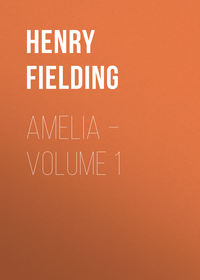 полная версия
полная версияHistory of Tom Jones, a Foundling
Jones, who more than once already had experienced this frolicsome disposition of the heathen goddess, was now again doomed to be tantalized in the like manner; for he arrived at the door of Mrs Fitzpatrick about ten minutes after the departure of Sophia. He now addressed himself to the waiting-woman belonging to Mrs Fitzpatrick; who told him the disagreeable news that the lady was gone, but could not tell him whither; and the same answer he afterwards received from Mrs Fitzpatrick herself. For as that lady made no doubt but that Mr Jones was a person detached from her uncle Western, in pursuit of his daughter, so she was too generous to betray her.
Though Jones had never seen Mrs Fitzpatrick, yet he had heard that a cousin of Sophia was married to a gentleman of that name. This, however, in the present tumult of his mind, never once recurred to his memory; but when the footman, who had conducted him from his lordship’s, acquainted him with the great intimacy between the ladies, and with their calling each other cousin, he then recollected the story of the marriage which he had formerly heard; and as he was presently convinced that this was the same woman, he became more surprized at the answer which he had received, and very earnestly desired leave to wait on the lady herself; but she as positively refused him that honour.
Jones, who, though he had never seen a court, was better bred than most who frequent it, was incapable of any rude or abrupt behaviour to a lady. When he had received, therefore, a peremptory denial, he retired for the present, saying to the waiting-woman, “That if this was an improper hour to wait on her lady, he would return in the afternoon; and that he then hoped to have the honour of seeing her.” The civility with which he uttered this, added to the great comeliness of his person, made an impression on the waiting-woman, and she could not help answering; “Perhaps, sir, you may;” and, indeed, she afterwards said everything to her mistress, which she thought most likely to prevail on her to admit a visit from the handsome young gentleman; for so she called him.
Jones very shrewdly suspected that Sophia herself was now with her cousin, and was denied to him; which he imputed to her resentment of what had happened at Upton. Having, therefore, dispatched Partridge to procure him lodgings, he remained all day in the street, watching the door where he thought his angel lay concealed; but no person did he see issue forth, except a servant of the house, and in the evening he returned to pay his visit to Mrs Fitzpatrick, which that good lady at last condescended to admit.
There is a certain air of natural gentility, which it is neither in the power of dress to give, nor to conceal. Mr Jones, as hath been before hinted, was possessed of this in a very eminent degree. He met, therefore, with a reception from the lady somewhat different from what his apparel seemed to demand; and after he had paid her his proper respects, was desired to sit down.
The reader will not, I believe, be desirous of knowing all the particulars of this conversation, which ended very little to the satisfaction of poor Jones. For though Mrs Fitzpatrick soon discovered the lover (as all women have the eyes of hawks in those matters), yet she still thought it was such a lover, as a generous friend of the lady should not betray her to. In short, she suspected this was the very Mr Blifil, from whom Sophia had flown; and all the answers which she artfully drew from Jones, concerning Mr Allworthy’s family, confirmed her in this opinion. She therefore strictly denied any knowledge concerning the place whither Sophia was gone; nor could Jones obtain more than a permission to wait on her again the next evening.
When Jones was departed Mrs Fitzpatrick communicated her suspicion concerning Mr Blifil to her maid; who answered, “Sure, madam, he is too pretty a man, in my opinion, for any woman in the world to run away from. I had rather fancy it is Mr Jones.” – “Mr Jones!” said the lady, “what Jones?” For Sophia had not given the least hint of any such person in all their conversation; but Mrs Honour had been much more communicative, and had acquainted her sister Abigail with the whole history of Jones, which this now again related to her mistress.
Mrs Fitzpatrick no sooner received this information, than she immediately agreed with the opinion of her maid; and, what is very unaccountable, saw charms in the gallant, happy lover, which she had overlooked in the slighted squire. “Betty,” says she, “you are certainly in the right: he is a very pretty fellow, and I don’t wonder that my cousin’s maid should tell you so many women are fond of him. I am sorry now I did not inform him where my cousin was; and yet, if he be so terrible a rake as you tell me, it is a pity she should ever see him any more; for what but her ruin can happen from marrying a rake and a beggar against her father’s consent? I protest, if he be such a man as the wench described him to you, it is but an office of charity to keep her from him; and I am sure it would be unpardonable in me to do otherwise, who have tasted so bitterly of the misfortunes attending such marriages.”
Here she was interrupted by the arrival of a visitor, which was no other than his lordship; and as nothing passed at this visit either new or extraordinary, or any ways material to this history, we shall here put an end to this chapter.
Chapter iii. – A project of Mrs Fitzpatrick, and her visit to Lady Bellaston
When Mrs Fitzpatrick retired to rest, her thoughts were entirely taken up by her cousin Sophia and Mr Jones. She was, indeed, a little offended with the former, for the disingenuity which she now discovered. In which meditation she had not long exercised her imagination before the following conceit suggested itself; that could she possibly become the means of preserving Sophia from this man, and of restoring her to her father, she should, in all human probability, by so great a service to the family, reconcile to herself both her uncle and her aunt Western.
As this was one of her most favourite wishes, so the hope of success seemed so reasonable, that nothing remained but to consider of proper methods to accomplish her scheme. To attempt to reason the case with Sophia did not appear to her one of those methods: for as Betty had reported from Mrs Honour, that Sophia had a violent inclination to Jones, she conceived that to dissuade her from the match was an endeavour of the same kind, as it would be very heartily and earnestly to entreat a moth not to fly into a candle.
If the reader will please to remember that the acquaintance which Sophia had with Lady Bellaston was contracted at the house of Mrs Western, and must have grown at the very time when Mrs Fitzpatrick lived with this latter lady, he will want no information, that Mrs Fitzpatrick must have been acquainted with her likewise. They were, besides, both equally her distant relations.
After much consideration, therefore, she resolved to go early in the morning to that lady, and endeavour to see her, unknown to Sophia, and to acquaint her with the whole affair. For she did not in the least doubt, but that the prudent lady, who had often ridiculed romantic love, and indiscreet marriages, in her conversation, would very readily concur in her sentiments concerning this match, and would lend her utmost assistance to prevent it.
This resolution she accordingly executed; and the next morning before the sun, she huddled on her cloaths, and at a very unfashionable, unseasonable, unvisitable hour, went to Lady Bellaston, to whom she got access, without the least knowledge or suspicion of Sophia, who, though not asleep, lay at that time awake in her bed, with Honour snoring by her side.
Mrs Fitzpatrick made many apologies for an early, abrupt visit, at an hour when, she said, “she should not have thought of disturbing her ladyship, but upon business of the utmost consequence.” She then opened the whole affair, told all she had heard from Betty; and did not forget the visit which Jones had paid to herself the preceding evening.
Lady Bellaston answered with a smile, “Then you have seen this terrible man, madam; pray, is he so very fine a figure as he is represented? for Etoff entertained me last night almost two hours with him. The wench I believe is in love with him by reputation.” Here the reader will be apt to wonder; but the truth is, that Mrs Etoff, who had the honour to pin and unpin the Lady Bellaston, had received compleat information concerning the said Mr Jones, and had faithfully conveyed the same to her lady last night (or rather that morning) while she was undressing; on which accounts she had been detained in her office above the space of an hour and a half.
The lady indeed, though generally well enough pleased with the narratives of Mrs Etoff at those seasons, gave an extraordinary attention to her account of Jones; for Honour had described him as a very handsome fellow, and Mrs Etoff, in her hurry, added so much to the beauty of his person to her report, that Lady Bellaston began to conceive him to be a kind of miracle in nature.
The curiosity which her woman had inspired was now greatly increased by Mrs Fitzpatrick, who spoke as much in favour of the person of Jones as she had before spoken in dispraise of his birth, character, and fortune.
When Lady Bellaston had heard the whole, she answered gravely, “Indeed, madam, this is a matter of great consequence. Nothing can certainly be more commendable than the part you act; and I shall be very glad to have my share in the preservation of a young lady of so much merit, and for whom I have so much esteem.”
“Doth not your ladyship think,” says Mrs Fitzpatrick eagerly, “that it would be the best way to write immediately to my uncle, and acquaint him where my cousin is?”
The lady pondered a little upon this, and thus answered – “Why, no, madam, I think not. Di Western hath described her brother to me to be such a brute, that I cannot consent to put any woman under his power who hath escaped from it. I have heard he behaved like a monster to his own wife, for he is one of those wretches who think they have a right to tyrannise over us, and from such I shall ever esteem it the cause of my sex to rescue any woman who is so unfortunate to be under their power. – The business, dear cousin, will be only to keep Miss Western from seeing this young fellow, till the good company, which she will have an opportunity of meeting here, give her a properer turn.”
“If he should find her out, madam,” answered the other, “your ladyship may be assured he will leave nothing unattempted to come at her.”
“But, madam,” replied the lady, “it is impossible he should come here – though indeed it is possible he may get some intelligence where she is, and then may lurk about the house – I wish therefore I knew his person.
“Is there no way, madam, by which I could have a sight of him? for, otherwise, you know, cousin, she may contrive to see him here without my knowledge.” Mrs Fitzpatrick answered, “That he had threatened her with another visit that afternoon, and that, if her ladyship pleased to do her the honour of calling upon her then, she would hardly fail of seeing him between six and seven; and if he came earlier she would, by some means or other, detain him till her ladyship’s arrival.” – Lady Bellaston replied, “She would come the moment she could get from dinner, which she supposed would be by seven at farthest; for that it was absolutely necessary she should be acquainted with his person. Upon my word, madam,” says she, “it was very good to take this care of Miss Western; but common humanity, as well as regard to our family, requires it of us both; for it would be a dreadful match indeed.”
Mrs Fitzpatrick failed not to make a proper return to the compliment which Lady Bellaston had bestowed on her cousin, and, after some little immaterial conversation, withdrew; and, getting as fast as she could into her chair, unseen by Sophia or Honour, returned home.
Chapter iv. – Which consists of visiting
Mr Jones had walked within sight of a certain door during the whole day, which, though one of the shortest, appeared to him to be one of the longest in the whole year. At length, the clock having struck five, he returned to Mrs Fitzpatrick, who, though it was a full hour earlier than the decent time of visiting, received him very civilly; but still persisted in her ignorance concerning Sophia.
Jones, in asking for his angel, had dropped the word cousin, upon which Mrs Fitzpatrick said, “Then, sir, you know we are related: and, as we are, you will permit me the right of enquiring into the particulars of your business with my cousin.” Here Jones hesitated a good while, and at last answered, “He had a considerable sum of money of hers in his hands, which he desired to deliver to her.” He then produced the pocket-book, and acquainted Mrs Fitzpatrick with the contents, and with the method in which they came into his hands. He had scarce finished his story, when a most violent noise shook the whole house. To attempt to describe this noise to those who have heard it would be in vain; and to aim at giving any idea of it to those who have never heard the like, would be still more vain: for it may be truly said —
– Non acuta Sic geminant Corybantes aera.
The priests of Cybele do not so rattle their sounding brass.
In short, a footman knocked, or rather thundered, at the door. Jones was a little surprized at the sound, having never heard it before; but Mrs Fitzpatrick very calmly said, that, as some company were coming, she could not make him any answer now; but if he pleased to stay till they were gone, she intimated she had something to say to him.
The door of the room now flew open, and, after pushing in her hoop sideways before her, entered Lady Bellaston, who having first made a very low courtesy to Mrs Fitzpatrick, and as low a one to Mr Jones, was ushered to the upper end of the room.
We mention these minute matters for the sake of some country ladies of our acquaintance, who think it contrary to the rules of modesty to bend their knees to a man.
The company were hardly well settled, before the arrival of the peer lately mentioned, caused a fresh disturbance, and a repetition of ceremonials.
These being over, the conversation began to be (as the phrase is) extremely brilliant. However, as nothing past in it which can be thought material to this history, or, indeed, very material in itself, I shall omit the relation; the rather, as I have known some very fine polite conversation grow extremely dull, when transcribed into books, or repeated on the stage. Indeed, this mental repast is a dainty, of which those who are excluded from polite assemblies must be contented to remain as ignorant as they must of the several dainties of French cookery, which are served only at the tables of the great. To say the truth, as neither of these are adapted to every taste, they might both be often thrown away on the vulgar.
Poor Jones was rather a spectator of this elegant scene, than an actor in it; for though, in the short interval before the peer’s arrival, Lady Bellaston first, and afterwards Mrs Fitzpatrick, had addressed some of their discourse to him; yet no sooner was the noble lord entered, than he engrossed the whole attention of the two ladies to himself; and as he took no more notice of Jones than if no such person had been present, unless by now and then staring at him, the ladies followed his example.
The company had now staid so long, that Mrs Fitzpatrick plainly perceived they all designed to stay out each other. She therefore resolved to rid herself of Jones, he being the visitant to whom she thought the least ceremony was due. Taking therefore an opportunity of a cessation of chat, she addressed herself gravely to him, and said, “Sir, I shall not possibly be able to give you an answer to-night as to that business; but if you please to leave word where I may send to you to-morrow – ”
Jones had natural, but not artificial good-breeding. Instead therefore of communicating the secret of his lodgings to a servant, he acquainted the lady herself with it particularly, and soon after very ceremoniously withdrew.
He was no sooner gone than the great personages, who had taken no notice of him present, began to take much notice of him in his absence; but if the reader hath already excused us from relating the more brilliant part of this conversation, he will surely be very ready to excuse the repetition of what may be called vulgar abuse; though, perhaps, it may be material to our history to mention an observation of Lady Bellaston, who took her leave in a few minutes after him, and then said to Mrs Fitzpatrick, at her departure, “I am satisfied on the account of my cousin; she can be in no danger from this fellow.”
Our history shall follow the example of Lady Bellaston, and take leave of the present company, which was now reduced to two persons; between whom, as nothing passed, which in the least concerns us or our reader, we shall not suffer ourselves to be diverted by it from matters which must seem of more consequence to all those who are at all interested in the affairs of our heroe.
Chapter v. – An adventure which happened to Mr Jones at his lodgings, with some account of a young gentleman who lodged there, and of the mistress of the house, and her two daughters
The next morning, as early as it was decent, Jones attended at Mrs Fitzpatrick’s door, where he was answered that the lady was not at home; an answer which surprized him the more, as he had walked backwards and forwards in the street from break of day; and if she had gone out, he must have seen her. This answer, however, he was obliged to receive, and not only now, but to five several visits which he made her that day.
To be plain with the reader, the noble peer had from some reason or other, perhaps from a regard for the lady’s honour, insisted that she should not see Mr Jones, whom he looked on as a scrub, any more; and the lady had complied in making that promise to which we now see her so strictly adhere.
But as our gentle reader may possibly have a better opinion of the young gentleman than her ladyship, and may even have some concern, should it be apprehended that, during this unhappy separation from Sophia, he took up his residence either at an inn, or in the street; we shall now give an account of his lodging, which was indeed in a very reputable house, and in a very good part of the town.
Mr Jones, then, had often heard Mr Allworthy mention the gentlewoman at whose house he used to lodge when he was in town. This person, who, as Jones likewise knew, lived in Bond-street, was the widow of a clergyman, and was left by him, at his decease, in possession of two daughters, and of a compleat set of manuscript sermons.
Of these two daughters, Nancy, the elder, was now arrived at the age of seventeen, and Betty, the younger, at that of ten.
Hither Jones had despatched Partridge, and in this house he was provided with a room for himself in the second floor, and with one for Partridge in the fourth.
The first floor was inhabited by one of those young gentlemen, who, in the last age, were called men of wit and pleasure about town, and properly enough; for as men are usually denominated from their business or profession, so pleasure may be said to have been the only business or profession of those gentlemen to whom fortune had made all useful occupations unnecessary. Playhouses, coffeehouses, and taverns were the scenes of their rendezvous. Wit and humour were the entertainment of their looser hours, and love was the business of their more serious moments. Wine and the muses conspired to kindle the brightest flames in their breasts; nor did they only admire, but some were able to celebrate the beauty they admired, and all to judge of the merit of such compositions.
Such, therefore, were properly called the men of wit and pleasure; but I question whether the same appellation may, with the same propriety, be given to those young gentlemen of our times, who have the same ambition to be distinguished for parts. Wit certainly they have nothing to do with. To give them their due, they soar a step higher than their predecessors, and may be called men of wisdom and vertù (take heed you do not read virtue). Thus at an age when the gentlemen above mentioned employ their time in toasting the charms of a woman, or in making sonnets in her praise; in giving their opinion of a play at the theatre, or of a poem at Will’s or Button’s; these gentlemen are considering the methods to bribe a corporation, or meditating speeches for the House of Commons, or rather for the magazines. But the science of gaming is that which above all others employs their thoughts. These are the studies of their graver hours, while for their amusements they have the vast circle of connoisseurship, painting, music, statuary, and natural philosophy, or rather unnatural, which deals in the wonderful, and knows nothing of Nature, except her monsters and imperfections.
When Jones had spent the whole day in vain enquiries after Mrs Fitzpatrick, he returned at last disconsolate to his apartment. Here, while he was venting his grief in private, he heard a violent uproar below-stairs; and soon after a female voice begged him for heaven’s sake to come and prevent murder. Jones, who was never backward on any occasion to help the distressed, immediately ran down-stairs; when stepping into the dining-room, whence all the noise issued, he beheld the young gentleman of wisdom and vertù just before mentioned, pinned close to the wall by his footman, and a young woman standing by, wringing her hands, and crying out, “He will be murdered! he will be murdered!” and, indeed, the poor gentleman seemed in some danger of being choaked, when Jones flew hastily to his assistance, and rescued him, just as he was breathing his last, from the unmerciful clutches of the enemy.
Though the fellow had received several kicks and cuffs from the little gentleman, who had more spirit than strength, he had made it a kind of scruple of conscience to strike his master, and would have contented himself with only choaking him; but towards Jones he bore no such respect; he no sooner therefore found himself a little roughly handled by his new antagonist, than he gave him one of those punches in the guts which, though the spectators at Broughton’s amphitheatre have such exquisite delight in seeing them, convey but very little pleasure in the feeling.
The lusty youth had no sooner received this blow, than he meditated a most grateful return; and now ensued a combat between Jones and the footman, which was very fierce, but short; for this fellow was no more able to contend with Jones than his master had before been to contend with him.
And now, Fortune, according to her usual custom, reversed the face of affairs. The former victor lay breathless on the ground, and the vanquished gentleman had recovered breath enough to thank Mr Jones for his seasonable assistance; he received likewise the hearty thanks of the young woman present, who was indeed no other than Miss Nancy, the eldest daughter of the house.
The footman, having now recovered his legs, shook his head at Jones, and, with a sagacious look, cried – “O d – n me, I’ll have nothing more to do with you; you have been upon the stage, or I’m d – nably mistaken.” And indeed we may forgive this his suspicion; for such was the agility and strength of our heroe, that he was, perhaps, a match for one of the first-rate boxers, and could, with great ease, have beaten all the muffled22 graduates of Mr Broughton’s school.
The master, foaming with wrath, ordered his man immediately to strip, to which the latter very readily agreed, on condition of receiving his wages. This condition was presently complied with, and the fellow was discharged.
And now the young gentleman, whose name was Nightingale, very strenuously insisted that his deliverer should take part of a bottle of wine with him; to which Jones, after much entreaty, consented, though more out of complacence than inclination; for the uneasiness of his mind fitted him very little for conversation at this time. Miss Nancy likewise, who was the only female then in the house, her mamma and sister being both gone to the play, condescended to favour them with her company.
When the bottle and glasses were on the table the gentleman began to relate the occasion of the preceding disturbance.









